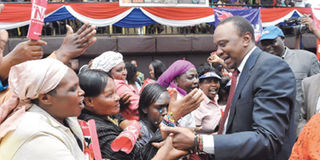How ICC and Raila created ‘coalition of the accused’

PHOTO | DPMPS TNA leader Uhuru Kenyatta meets women supporters at the Nyayo National Stadium in Nairobi on December 1, 2012.
What you need to know:
- How was the Uhuru-Ruto ticket possible? Two things: the ICC case and Prime Minister Raila Odinga
- Due to his support for the ICC, the proceedings have antagonised Mr Odinga with the accused. Mr Ruto and Mr Kenyatta’s supporters have been persuaded that if Mr Odinga is elected President, he will put the two on the first plane to The Hague
- Prof Kindiki Kithure, a law scholar, argues that general clauses in Chapter Six of the Constitution, such as those requiring State officers not to expose the office they occupy to ridicule or not to conflict their interest with the national interest, can supplant the obvious, outright provisions of the Constitution
A rumour circulated in Mt Kenya at the height of March 2008 coalition Cabinet negotiations between President Kibaki and Prime Minister Raila Odinga which unsettled many residents.
Eldoret North MP William Ruto was to be appointed Internal Security minister.
Amidst the hostility between the Kikuyu and Kalenjin, some Mt Kenya residents could not reconcile themselves to the idea of Mr Ruto as the minister in charge of police.
Many Central Kenya residents whose relatives had been killed during the 2007/8 violence in the Rift Valley were hostile to Mr Ruto in whose constituency the Kiambaa church massacre occurred.
On Sunday thousands of them will flock to Nakuru Afraha Stadium — the same venue that for months hosted victims of the post-election violence — to rally support for a pre-election coalition deal involving Mr Ruto as Mr Uhuru Kenyatta’s running mate in the next elections.
Crimes committed
The International Criminal Court (ICC) has committed the two to trial over crimes committed during the violence.
But how was the Uhuru-Ruto ticket possible? Two things: the ICC case and Prime Minister Raila Odinga.
The ICC case is the bond that binds the Uhuru-Ruto ticket that will be launched in Nakuru’s Afraha Stadium Sunday.
The Economist has dramatically characterised it as a “coalition of the accused’.
Due to his support for the ICC, the proceedings have antagonised Mr Odinga with the accused.
Mr Ruto and Mr Kenyatta’s supporters have been persuaded that if Mr Odinga is elected President, he will put the two on the first plane to The Hague.
The result is a strategy is a calculated to ensure that Mr Odinga does not assume power.
Mr Aden Duale, the United Republican Party spokesman, has declared that their partners must read from the same script on the ICC.
“The party that we (as URP) shall form a coalition with must be the party that fundamentally understands the ICC equation,” he said.
And even as they hit the stump in search of votes, their candidatures continue to be the subject of a highly emotive debate amongst Kenyans.
The debate has mainly revolved around the motive behind the ticket, relationship between Kenya and other countries in case they win the presidency as well as logistics of governing the country while under trial in The Netherlands in the event they are elected.
| NATIONAL AGENDA |
|
Prof Kindiki Kithure, a law scholar, argues that general clauses in Chapter Six of the Constitution, such as those requiring State officers not to expose the office they occupy to ridicule or not to conflict their interest with the national interest, can supplant the obvious, outright provisions of the Constitution.
But Mr Simekha JME, a governance expert, says the ticket has nothing to do with national interest.
“This coalition of suspects is built on the fear of the consequence of the ICC case. It is a selfish coalition purely driven by the desire to defeat the cause of justice,” he argues.
And writing in the Daily Nation two weeks ago, Prof Biwott Kurgat of United States International University pointed to possible isolation of Kenya if the two win the election.
Prof Kurgat argued that Kenya must continue cooperating with the ICC or live with the consequences.
“Any attempt at circumventing the law would drag the country the way Omar Al-Bashir has done to Sudan; a pariah state that exists perilously on the fringes of the international scene.”
“What is clear is that the loss of Western goodwill would lead directly to cutbacks in international financing for important sectors such as infrastructure, health and currency stabilisation, leading to economic turmoil,” he wrote.
“Voters are therefore called upon to balance the right of the ICC pair to run for office against the overriding interests of 40 million Kenyans.”




